by William Simmons
A driving force in the home entertainment industry since his pioneering work on laserdiscs and DVDs with Elite Entertainment, Don May, Jr. drew upon a lifelong love of cinema to bring fans worldwide special editions of both classic and obscure horror and science fiction films. Instrumental in restoring The Texas Chainsaw Massacre, Halloween, and Night of the Living Dead, Don has had his hands on many of the milestones of horror history, unearthing rare film elements and preserving this often critically maligned storytelling tradition.
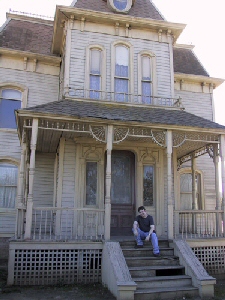
Displaying a fan's enthusiasm and a perfectionist's attention to detail, Don early established a reputation for caring as much about the technical polish of low budget obscure midnight movies as other studios lavish over mainstream hits. He brought this craftsmanship and critical acuity with him when he left Elite to form Synapse Films in 1997 with long-time friend and fan Jerry Chandler. This move resulted in some of the finest, most provocative, challenging home DVD releases the market has seen. From the exploitative joys of Brain Damage to the terrifying cruelty of Thriller: A Cruel Picture, from the poetic disturbance of The Image to the splatter bliss of the darkly comic Street Trash, Don's company had been largely responsible for spearheading the horror and cult home entertainment revival of the last decade.
Showing a knowledge of cinema as diverse as his technological expertise, Don limits himself to no one genre, no one populist movement. While he is an unapologetic fan of cult horror, he is always on the lookout for unique films, regardless of marketing niche. This adventuresome spirit and devotion to quality comes at a price. Synapse finds itself competing with labels who enjoy the financial backing of major corporations, irate distributors with little appreciation of underground cinema, and a fan base that can be as fickle as it is opinionated. Still, Don and Synapse carry on, seeking quality at the expense of easy profits by giving new talent a showcase in their Small Gauge Trauma DVDs, and through the release of such rare titles as the Legends of the Poisonous Seductress Series. Great storytelling and imaginative craftsmanship are key in this company's catalogue, where one can see the critically acclaimed Triumph of the Will sharing space with Eurohorror titans JessFranco and Jean Rollins. Perseverance in a daunting market is Don's goal as he prepares to release a barrage of new cinematic dreamscapes to a sensation hungry public. Here to speak to William Simmons about his views on craft, genre, and DVD production, is Don May, Jr., preserver of nightmares�
* * *
William Simmons: You have been involved in various aspects of film restoration and DVD creation, which has allowed you to work on films both legendary and obscure. What has changed during the years in both the way you view this work and how you feel the technology and/or goals of film restoration and distribution have altered?
Don May: So much has changed, really. Fifteen years ago, we didn't have the computer power we have today and, now, you can scan an entire film into a computer and work completely in the digital domain. I never used to be able to do that. Before, we had to transfer the film to tape and go tape-to-tape doing filtering and clean up. Now, we input the film and clean the frames digitally using proprietary programs similar to, say, Adobe Photoshop. It's much more expensive, but much more versatile now, than it was over a decade ago. Audio, too. You can input the entire film soundtrack and remove ticks, pops and edit much more easily these days. It's amazing how much has changed.
WS: When did you become interested in the horror, science fiction, and cult genres? What aspects of human experience do these genres explore that other genres do not?
DM: I was always a fan of horror movies. Since I was so young I can barely remember anything! I just enjoyed being scared and I was fascinated, at an early age, how something on film could raise your emotions so much. The aspect of "fear" is something we all have and something we all react to differently. For me, "fear" is something I love to explore� what makes, say, The Exorcist so scary to some and not to others. I just love watching how different directors use the film medium to manipulate our emotions.
WS: What aesthetic and emotional tools do these movies possess that distinguish them from other genres?
DM: Scary movies are some of the most powerful because they reach deep down into our souls and WANT to make us scared. It's amazing that people (like me) love this feeling. I don't know why I like to be scared, or grossed-out so much with gore� I just DO! It beats sitting in a theatre and watching something like The English Patient!
WS: How do you view many of the films you work on, as art or entertainment? How do YOU make the distinction? Or is the presumption that a difference exists itself ignorant/arrogant?
DM: Depends on the director, really. It also depends on my appreciation for said director. Because we are a small company, we don't usually get the opportunity to release films that many consider "art". Criterion does that. It's my firm belief that ALL films are made to entertain. It's just that not all films entertain everyone equally. There are many directors I've worked with who I WOULD consider artists, so does that make their films "art"? Don't know.
I don't think it's ignorant or arrogant to say there is a difference. For example, Andy Warhol was involved with films that many consider art, but I don't think many people consider then "entertaining" necessarily. I guess it depends on the point the director is trying to make. Is showing a man sleeping for 8 hours "entertaining"? Nope, not to me. But many consider it a challenging work of societal art. For me, that would be boring. But that doesn't make it any less relevant really. Different strokes for different folks.
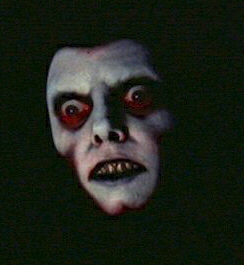
WS: When/how did you become a fan of horror and cult cinema?
DM: From the moment The Exorcist scared the living shit out of me as a child, I became interested in horror cinema. I was horrified and, as I grew older, I was fascinated that a film like this could make me so frightened. So scared I had to sleep in my parents' room for a week afterward.
WS: How/why did this grow into the desire to become professionally involved in the genre as a business?
DM: The way these films manipulate you and scare you interested me. I always wanted to be in the film business. Not so much as a director� I honestly don't think I have the "vision" to direct a film, honestly. I wanted to be "behind-the-scenes" as a writer, producer or whatever. I loved horror and that's what I wanted to do. There honestly wasn't a desire to be in the home video side of the business for me but, honestly, I was hurting for something to do after college. The job market sucked, so I figured the only thing I could do was create my own business. Thank God it succeeded, otherwise I'd probably just be selling insurance for State Farm or something.
WS: How has working intimately on films shaped your perception or appreciation of them?
DM: Well, I certainly CAN'T enjoy many movies anymore! I really love horror and sci-fi films, but I just can't really drag myself to the theatre as much as I used to. Audiences have changed. Kids laugh, joke, throw food and use their cell phones while I'm trying to enjoy something I paid $15 for to get in. Honestly, I'm getting jaded in my older years. Many films I loved as a child I just don't have the patience to watch anymore. I used to watch all kinds of horror in high school and college. I'd watch everything. Now, I can't bring myself to watch films like I used to. I go to the cinema maybe once or twice a month when I used to go every weekend (twice)! Also, I now find myself criticizing films when I watch them. I see mistakes in the color timings, the editing, the sound� being in my end of the business, in many ways, has made me become too critical to enjoy anything.
WS: Describe your earlier jobs in the laserdisc/DVD industry. How did you accomplish what many other fans only dream about, making the leap from fan to industry professional? Likewise, what special skills or knowledge allowed you to enter the field? Lastly, which skills do you feel you need to master now that the technology and market is dramatically changing again?
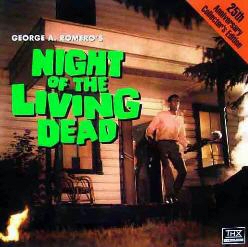
DM: I first got into the business in 1992 and released my first LaserDisc in 1993. I did graduate college with a degree in Broadcasting, but, honestly, it didn't do me one bit of good. I have yet to use, really, ANY of the skills I learned in college outside of writing/language skills. Our first release was Night of the Living Dead and all I did was contact George A. Romero and Image ten (the film's trustees) and ask them if we could restore it. I didn't know what the fuck I was doing back then. Honestly, I had NO idea. I didn't know the first thing about the technology on how to create a LaserDisc release. I was a fan of the format, but that didn't mean I knew how to make one! It was a learning process and I spent my entire life savings, one year of my life without getting paid anything and moved half-way across the U.S. to "hopefully" succeed. Luckily, I did! I wouldn't recommend doing what I did to anyone who's looking for advice on how to get into this industry. I jumped in with both feet and, thankfully, figured out how to swim. The ONE piece of advice I can give, though, is, if you are interested in getting into this field and starting your own business� DON'T! You'll probably just lose all your money. We got REAL lucky with Night of the Living Dead � had that failed, I'd have been miserable and broke.
WS: How did you become involved with Elite Entertainment? Which duties did you perform there? What were some of your more challenging experiences there? Most rewarding?
DM: I was working as a buyer at a LaserDisc store in Bloomington, Illinois after college (like I said, I couldn't find any work with my degree). My distributor rep and I hit it off pretty well. He was a horror fan, too, and we started complaining that no one had treated Night of the Living Dead with the respect it deserved. No one had restored it or done anything with it that actually involved the folks who made it. I was having a real shitty day at work and wanted to quit my job and was wondering what I could do if I did. I called my rep and said, "Are you sick of your job, too? What if we did Night of the Living Dead ourselves� the right way? Are you game?". So, we met at the "Zombie Jamboree" show in Pittsburgh and hit up the film's makers for a proposal/deal. They bit� we quit our jobs and started Elite. Everyone thought we were nuts. I pretty much supervised the transfers and compiled the best elements to use for the releases. I was the guy who found the materials, researched the extras, etc. The most challenging thing about Elite was that I lived my whole life in Illinois and had to move to New Jersey. That was REALLY tough and I never got used to the geography change. The most rewarding thing about it? Hmm� I guess that I was able to turn my role in Elite into the much more satisfying (for me) SYNAPSE FILMS. I'm just happy that my falling out with Elite happened early in my years so I could remember the lessons I learned (good and bad) and apply it to my future endeavors.
WS: While at Elite you worked on such classics as Halloween, Dawn of the Dead, and The Texas Chainsaw Massacre. How did you gain access to previously unseen materials? What were your goals when working on such influential films? Your biggest fears?
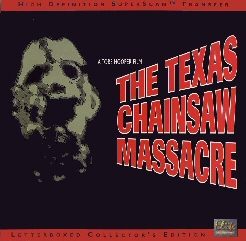
DM: Working with many filmmakers, you really uncover some amazing stuff. With The Texas Chainsaw Massacre, I was able to research (thanks to Tobe) where he suspected a lot of the unused footage/trims were located and we hit a goldmine. For Dawn of the Dead , Richard Rubinstein gave us access to scripts, photos, etc. that we never saw before. With A Nightmare On Elm Street, Wes Craven literally allowed me to raid his office for stuff and, using his records, I was able to trace back to the vault where the unused/edited footage was. I think I STILL have those original storyboards in my basement somewhere� Wes, if you are reading this, I promise I'll get them back to you if I find 'em! The ultimate goal, of course, for me, is to present the film in the best, most beautiful way possible. For the current technology, I want my transfers to be the best they can be, using the best tools I can with our budget. Anyone who works with me knows that I'm a stickler for quality� spending MUCH more money than I should to achieve my goal. My biggest fear, and, thankfully, I haven't had to worry about it yet, is actually ruining original film materials, like a film negative.
WS: What prompted you to form Synapse Films with partner Jerry Chandler in 1997?
DM: Even though my experience with Elite, towards the end, was a miserable one, I still wanted to stay in this business. No matter how awful I was feeling about the whole Elite thing, I actually wanted to continue. At first, Jerry was just going to give me the money on loan to start my own business and let me pay him back over time but, sneaky me, I made him sign paperwork that gave him the same amount of shares in Synapse that I had. Jerry and I had been friends for years and years and I just knew I wanted to be in business with him. Actually, he approached Elite with the opportunity to get involved with us then but my other business partner, at the time, wasn't interested. Now I know why. Jerry was smart, had his own business to begin with and was college educated in the world of business. He knew how to run a company the right way. I knew how to do the digital and restoration work. We made the perfect pair.
WS: Describe some of the biggest challenges when first starting Synapse.
DM: Well, the first thing I had to get over were all the stupid rumors circulating that I was the fuck up at my previous company. I heard all sorts of stupid crazy rumors like I had made passes at my business partner's wife. My favorite one was that I "wasn't pulling my own weight" with Elite, so they let me go. There were even businesses I had worked with previously that told me what "they" heard and they were, at first, hesitant to work with me. Once they realized it was all bullshit, all was fine� and the years have certainly proven I am an up-and-up guy. I think one only has to look at where I am now to figure out the things that were said to try and upset me and make it difficult for me weren't true.
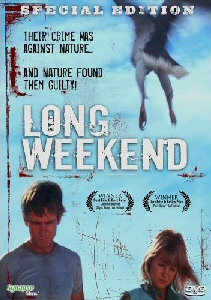
WS: Which films are you most proud to have released on DVD? Why?
DM: I'm proud of all of them, but, honestly, but for Synapse I went 200% above and beyond for our release of Long Weekend. That movie has meant so much to me over the years and, when Synapse had the opportunity to do it, I hadn't been so excited over a project since working on Night of the Living Dead. I just absolutely LOVE that film. It's not balls to the wall scary, but it works on so many other levels. It has some pretty horrifying undertones and some GREAT set pieces. The "shoe dropping" sequence in Long Weekend is one of my all-time favorite scenes in ANY horror film. It just gives me chills.
WS: Which DVDs disappointed you most in terms of sales, re-mastering, available elements work, or your own work?
DM: For each of these, there is a different answer, really. For sales� well, Long Weekend! No one bought it. For re-mastering, I was really disappointed in the film materials we had available for The Grapes of Death and Flavia the Heretic. For these two titles, I didn't have a hand in re-mastering myself and had to get the digital tape materials from someone else. They are good for what they are but, had I had access to the film materials myself, I could've made the presentations better. I haven't released anything under Synapse where I was disappointed with my own work, though. If my work wasn't to my satisfaction, I wouldn't release it until it was right. That's just the way I am.
WS: Which film has presented you with the most technical difficulties over the years as either a restorer or seller? Which directors, producers, or actors have proved most challenging to work with for materials and/or supplements? Which have proved most helpful? Which have proved most annoying?
DM: The film that was a major league pain in the ass to do was Castle of Blood. We had to compile three different prints and two different soundtracks (and subtitles where needed). But I love the film so much, I didn't care that it was difficult. Also, Barbara Steele and Margheriti's son loved it, so I'm happy that they are happy. One of the highlights of my career was actually being surprised by Barbara when she came to visit Roy Frumkes and me during the transfer of Street Trash. She knocked on the door and opened it and I was floored when she came walking in. My jaw hit the floor that this lovely, amazing actress was standing in the same room as me. We put up the Castle master and she had a good time� she ate lunch with us and went on her way. She told me I had a "sweet smile"!
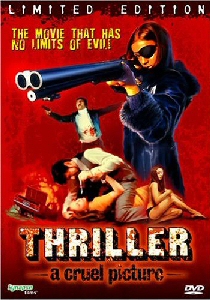
The director who absolutely hates us, I guess, is the director of Thriller , Bo Arne Vibenius (at least I "think" that's his name as he seems to have a few email aliases he tries to send notes to us from once in a while to stir things up). We got his movie completely legally, but he thought it was worth a bunch more money when Kill Bill came out, so he tried to get it back after he sold it. He still sends us threatening emails to us almost every week. We send them off to our lawyer and that's it. I don't even read them because we told him YEARS ago to just send things to our lawyer. He doesn't do that, so I just ignore them and send them off myself to our legal council. The last note he sent threatening us was something to do with a mythical Swedish Film Commission with an amazing email of [email protected], or something like that. HILARIOUS! He hates us, but so what� we got his film and he was upset about it. Some day, maybe he'll wise up and cash those royalty checks we keep sending him. It's more than he would've gotten from anyone else.
The most helpful person, I'd say, is Roy Frumkes� he's such a nice guy and had tons of things for us for Street Trash. We chat and are great friends. He was so helpful and enthusiastic, I love the guy! One of the nicest guys we've ever met!
WS: How do you determine which titles to release for Synapse? What is your aesthetic or financial criteria? And how often do the two butt heads?
DM: Jerry and I don't really butt heads about our releases. I let Jerry wade through all the submissions first (laughs) and then, if he likes the movie, even somewhat, he'll pass it on to me for my opinion. Mostly, if Jerry and I like the movie, we'll do it. The last time we out and out refused a title was many years ago when the Guinea Pig series was offered to us. Neither of us are fans of that series, really. Obviously, things we really want to do have come our way and we've had to refuse because of financial reasons. We aren't a multi-million dollar corporation, so we cannot pay tons of money in advance for a lot of titles (like Evil Dead before Anchor Bay got it years ago). People ask sometimes for ridiculously large amounts of advance money for titles and we just won't do it, even if we really want it. It's too much of a risk. Pay too much for a title and the entire release could sink a company if handled wrong.
WS: How do you feel the DVD industry has most significantly changed? How do you feel the public's understanding and appreciation of genre cinema has evolved? How, if at all, does this effect the art and business of preparing and selling horror and cult DVDs?
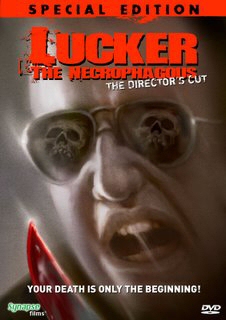
DM: Right now, the DVD industry really sucks. The problem is there is SO MUCH product on the shelves that stores can no longer carry everything. Ten years ago, there were, maybe, 30-40 titles released every Tuesday. It was easy for places to pick up our stuff because we were releasing things gradually. Now, you've got 300+ titles coming out every week and the studios are buying up all the shelf space in the stores. The public STILL wants our product� they just have to realize that walking into your local Best Buy outlet isn't going to be the answer anymore. Online is the future and that's something that the public needs to realize if they want to support cult labels like us. BUY ONLINE! When I first started in this business 15 years ago, no one paid much attention to restoring and bringing out beautiful special editions of horror films. Even though I'm a modest guy and would never say so myself, I have heard many people credit me for really blazing the trail for the horror film to be treated with more respect on home video. My company, at the time, was credited for really starting a "revolution" of treating horror with respect in the industry it never had before. Glad I could blaze the trail for other to ride on my coattails, I guess! Hahah! It's hard now though. Many of the important horror films are already out. Taking up space on the shelves are low-budget quickies that seem to be all the rage with the mini-majors like Lion's Gate. Wouldn't you rather see things on the store shelves like Street Trash or The Deadly Spawn more so than Dr. Jekyll's House of Bloody Stools or some shit like that? Well, because Lion's Gate has more money, they can stock their stuff on the shelves, leaving many bonafide classics of the genre like Street Trash to only the indie outlets. This hurts sales for companies like us.
WS: Where do you see this industry heading as an art? As a business?
DM: As an art, I haven't thought much about it. In this day and age of low budget horrors being cranked out week by week, I don't think it has anything to do with art� it's all about making the most money for the majors. As a business� well, for the major studios, it's making them TONS of money, while leaving the indie labels to languish in low-sales hell.
WS: What are the specific challenges of competing with major companies?
DM: The all-mighty dollar. The studios have a lot of that. They buy the shelf space up for their Pirates Of The Caribbean Part 56, which keeps us from getting things like Long Weekend on the shelf. Major chain stores, like Best Buy, actually charge the indies a PER PIECE fee to be on their shelves! They don't do that for the majors, I bet. They penalize us for the "privilege" of being on their store shelves.
WS: How crucial do you feel independent labels have been to the restoration, preservation, and appreciation of obscure genre films? What role do you feel that you and Synapse has played in this?
DM: Many of the indie labels spend a lot of money on projects and see little return. We just squeeze by with a little profit� enough to carry us on to the next project. Most of us just want to please our fans and show them that we care enough to do our best. There's no money in this business� most smart people would NEVER start a DVD label in this stage of the DVD distribution game, unless they want to lose a lot of money. By the number of emails, phone calls and letters we receive every day, we know there are those that appreciate what we do and that keeps us going. We'll keep going until it doesn't make sense for us to remain in this business. Hopefully, that will be a LONG time, but we realize that the profits (if any) are small for us. Since I've been credited as starting the whole "horror video restoration" boom, I guess I'll say that I feel I've continued that tradition with Synapse Films. I just don't want to come off as a self-appreciating kinda guy. We put out the films but the FANS are what keep us going. Without them, we are nothing.
WS: Horror fans are often a dedicated but opinionated crew, with the strength of their convictions often as changeable as their loyalties. How does the ever changing enthusiasms and prejudices of fans in general effect your business? Your work ethic or goals?
DM: We listen to our fans. If they have a compliment, or a complaint, we listen. Look, we have people out there that like to stir shit up for no reason. I guess it makes them feel important, or that they are communicating with us on some other plane of existence!? I mean, some people are like "there is one frame missing from reel 6 of such-and-such", or "Hey� this transfer has a slightly different color during a 5 minute scene in HD than my crappy, drop-out ridden VHS, so I'll keep that instead!". I mean, really? But, there are many folks out there that actually appreciate the work, blood, sweat and tears we put into every release we do. I read a lot of the forums and I see both sides� we know there are reviewers out there with specific agendas who do nothing more that try and act smarter and more intelligent than everyone else. We (as well as the TRUE fans who are loyal to us and other companies) can see through these facades. We just do the best we can with what we are given by the licensors and even if it's the most perfect presentation EVER, we'll still have people that knock us for something. We're used to it� we laugh and move on.
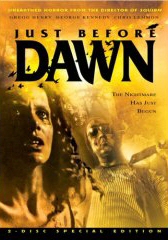
WS: There were rumors concerning your involvement in the Media Blasters release of Just Before Dawn, with some sources blaming you for poor visual content and missing footage. You mentioned elsewhere that these were unfounded rumors. Could you describe what happened here?
DM: This is hilarious! "I" know the truth, and so do the rumor mongering idiots that proliferated this thing. I was working in Los Angeles and someone from Media Blasters asked me to take a look at the master for Just Before Dawn for the purposes of possibly hiring me to help restore it. I wanted to look at it to see what sort of extensive VISUAL restoration I could do to the actual film materials used for the transfer. I got the master and scanned through it in about 2 minutes to get an overall look at the damage, age, and condition of the master. It was pretty fucked up� the transfers colors were bad and there was plenty of dirt and scratches. That's ALL I looked at. I didn't watch the movie and compare it to any other versions� I looked at it for a few minutes. I'm not looking for film content. I'm not sitting for hours, going through something like that unless we have a signed deal that specifies what I need to do and how much I'm being paid. I gave them my opinion on the condition of the film master and what I recommended to do to CLEAN UP the visuals in a cursory few minute inspection. Then it comes out and suddenly, it's MY fault that it's cut? I was like "what the fuck"? I didn't do anything except look at the master for two minutes and suddenly I'm responsible for their release getting messed up? I was not paid by Media Blasters to do ANYTHING for this release. Again, like I said before� it's just that some people who are obviously screaming for attention in this industry, try to get it any way possible. For the record, the person I dealt with at Media Blasters about looking at the master is NOT the person who started this rumor. He's a really cool guy, actually.
WS: Could you tell us what you plan on doing with the Asian titles you were initially going to release in partnership with Panik House? Why are these titles important to the genre? What in terms of story or style distinguishes them? What extra material do you intend on including with them?
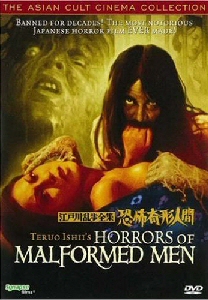
DM: Well, five of the titles are already out with plenty of extras. We still have two more that will be released late in 2008 or early 2009. Many film historians actually consider one of the films, Horrors of Malformed Men , as one of the most important horror films in the history of Japanese cinema and I have to agree. Horror was banned in Japan for decades and, even though our version has been released in the US, in Japan, it's still not on DVD. Very controversial� it raised a few eyebrows back in the day! And, not surprisingly, of the five that are out, this is the most popular. For the last two we are releasing, we haven't really discussed the extras yet.
WS: Which film(s) would you most like to release or work on but have been unable to secure rights to? What has been the difficulty involved?
DM: There are a few films that are currently out on DVD that I would still love to at least help restore and have a part in. The first is The Exorcist� I'd love to restore the ORIGINAL version in HD. I hate the new "Version You've Never Seen". I also would like to go back to the 16mm negatives for Martin, like I did with Night of the Living Dead, and do an all-new restoration. George A. Romero wants to do it, too. That anamorphic DVD from Lion's Gate is so awful� the movie is cropped for anamorphic widescreen and George shot it 1.33 full-frame! My favorite movie of all time is The Last Picture Show� how I would love to go back to the film negatives and do a 2K restoration on that. That would be the ultimate for me. The obvious stumbling block for this is that Sony owns it. They could hire me to do the work, but I'd never get to release it on my own label, I'm sure.
WS: Could you give the average reader a general overview of the re-mastering process?
DM: Oh God, that is something I could never answer without writing a book! Here are the steps, very quickly:
- Find LOTS of money that you can afford to lose.
- Buy the film rights.
- Get the negative.
- Transfer in HD.
- Spend more money because of unforeseen problems.
- Deal with Audio Restoration which costs more money.
- Put it on DVD and not make any sales to get your money back!
WS: You were one of the companies influential in getting some of director Jess Franco's more obscure films released, uncut and restored. Synapse gave fans Exorcism, which was infamous for its various re-edits and Vampyros Lesbos, a fan favorite featuring several of Franco's thematic and stylistic obsessions. What drew you to Franco's work? How did you decide on these two titles in particular?
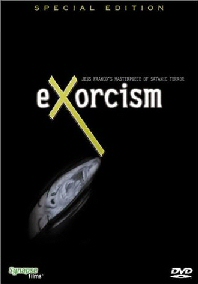
DM: We are approached by the licensor and we knew, at the time, that there weren't many erotic lesbian vampire movies on DVD. Honest to God, that's the truth� so we did it. Exorcism came to us after Image Entertainment bought it in a film package, then deemed the material too controversial to release themselves. So, the called us and asked us if we wanted it. Of course, we just said "Yes" because we were crying for titles at that early stage in our company.
WS: In Exorcism you included a commentary with Franco. Where you personally involved in setting this up? If so, how did you find Franco met your preconceived notion of him -- did he surprise you or fit the image that the public has made of him? How did he treat you and your interest in his work? Lastly, how do you feel that he views his career, with regards to Exorcism and Vampyros Lesbos in particular?
DM: Franco was in Chicago for a convention and, at the time, I lived in Illinois. So, we coordinated some time to get him to talk about the film. He was great! It was a great time. I recruited my commentary guy, Armand Petri, who helped me with the original Night of the Living Dead release. I knew what Franco looked like and that he was a constant smoker, so I came prepared and sat in on the commentary. Just a wonderful guy� so passionate about his films and full of amazing stories. We were laughing and joking about some things off mic and he really made me feel comfortable around him. I think he's extremely proud of his career and has no regrets.
WS: Synapse has given many ignored or maligned horror and experimental films a second chance on DVD. Christmas Evil was such a title, largely misunderstood and ignored when theatrically released. Why do you feel this film was bypassed by fans and the mainstream media initially?
DM: Must be something about it because it was bypassed by the public when we put it out on DVD, too! (Laughs). I think it's great! So funny and horrifying. The director, Lewis Jackson, was fun to work with, too. It was a small release and, had the theatrical distributor done a better job, I'm sure it wouldn't have been swept aside at the time of release. Low budget movie with a low budget theatrical distributor that just didn't catch on. It deserved to, though. At least we got John Waters, a big fan of Christmas Evil, to help us out with a commentary!
WS: How do you answer the charge that violent art (cinema, books, etc) inspire antisocial behavior? Have you or Synapse ever been caught up in the cultural crossfire regarding horror and/or violent media?
DM: Well, I don't believe it. It's a good thing to blame it on, I guess. I mean, I'm not sane and I watch horror films all the time! It's never made me go out and kill anybody! Haha! The only thing we ever had was a mentally ill fellow come to Novi, Michigan (where our offices are located) and create a fake bomb scare at the local police station. Weeks before he took the bus to us, he sent us all these weird faxes with rockets and bombs on them and total jibberish about blowing shit up. He was mentally ill� he told the cops he wanted to visit the guys that put out his favorite movie, which was Thriller: A Cruel Picture! Luckily, I was in LA at the time. He couldn't find our office, went to the police station and told them he had bombs. They had to evacuate and then call in the bomb team and robot to look at the duffle bags he put outside the doors. I think he wasted away in jail because there was no one to make his bail. Don't know what happened to him. So, in effect, our DVD release DID cause anti-social behavior! Oh shit, maybe they're right�
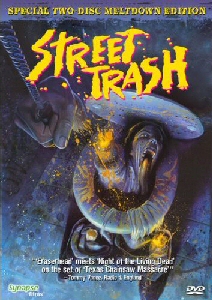
WS: One of your most generous releases has to be the special edition of Street Trash: The Meltdown Edition , wherein you pack two discs with a veritable history of the making of the film. How long did gathering supplements for this take, and who was most instrumental in bringing it to fruition?
DM: Well, Roy Frumkes is certainly the most important guy here. He was instrumental in getting the documentary done and it took him YEARS to track everyone down. Really, the title took about 5 years to get done. We had done the transfer all the way back when we had done Castle of Blood. It took many years later for him to find everyone and finish the documentary. It was the longest project we've ever worked on.
WS: While focusing primarily on horror, cult, and science fiction films, you also express an obvious respect for, and love of, experimental cinema, including such culturally important works as The Image and Triumph of the Will. Why did you take on these movies? What do they tell us about ourselves and society at large? What do they offer the casual film fan? The genre devotee?
DM: For The Image, we just loved the movie. It's pretty shocking and controversial, and we are smart enough to know that these kinds of things translate into sales. I knew that Image had released Radley's other films, but most were cut� We wanted to do The Image the right way and people LOVED it! We just completed a new high-definition version of The Image, too, which looks even better� too bad making Blu-Ray discs is still too expensive for us yet!
Triumph of the Will was brought to us by film preservationist Robert Harris. I started talking with him back when I did Night of the Living Dead and he had approached Criterion with the opportunity first, but they passed. Too controversial for them, I guess. Stupidest mistake they ever made, as the title has become our biggest selling title to date! Hooray for us. We certainly agree that Hitler was a despicable, disgusting person� I don't even WANT to call this tyrant a human being, because, in my mind, he wasn't. But, there's no denying that Triumph of the Will is one of the most powerful films ever made. Not only in technique, but just to give you a peek at the mind of Hitler. We didn't tackle it at first though� we gave it a lot of thought and we WEREN'T going to do it unless we could show the world that, even though the film is important, we don't agree at all with Hitler's beliefs. So, we had a great commentary recorded that showed you exactly how despicable Hitler and his regime were. We had to give it some historical perspective� we couldn't just put it out with no reference point of our beliefs. Of course, the neo-nazis emailed us to tell us we were propagating a lie because, they say, the Holocaust never happened� assholes. I guess we lost a few of them as fans after we released Triumph. That's OK, we don't want those kinds of people as fans.
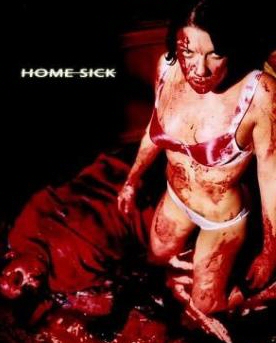
WS: You served as executive producer on Home Sick. Tell us more about this film and the people behind it. How prepared were you for the duties of production? What did you and the director hope to accomplish?
DM: I think the director just wanted to FINISH the movie! They came to Synapse with a really rough-cut of the film and we came in with the finishing money for editing, color-timing and mixing. We love the movie and think that, with the finished product almost done, it's a great little film that deserves some attention. Evan Katz and Director Adam Wingard are great people. But, the movie was plagued with some crazy curses! First, the film was lost because the computer they used crashed and we lost the audio. This caused Adam to have to completely remix the audio from scratch and, when he did, it kept drifting out of sync. The color timing looked like it was "Home Sick Piss-Christ". It looked like it was shot through a glass of piss, so we had to re-time it with new colors, etc. Then Adam decided to edit the film down (which was a good idea for pacing) so we had to do that. Then we had to create opening and closing credits for it, etc� Home Sick will come out soon as we are ALMOST done.
WS: One of your more controversial releases has been Thriller: A Cruel Picture. Releasing this in R and unrated editions, did you face much controversy from the public? From fans or the stores? More importantly, what exactly was the disagreement between Synapse and the film's director Boarne Vibenius? Why did he appear to not what Synapse releasing his movie?
DM: Well, aside from the mentally ill guy mentioned in the question above, we didn't have much trouble except with the director. He just wanted his movie back because he thought it was worth millions after Kill Bill (he couldn't be MORE WRONG). He just tried every method he could to try and get the film back without actually hiring a lawyer, even though he wanted us to believe we didn't have the legal rights. He keeps telling us the original company he sold it to (and who we inherited the rights from) didn't do something legal, so the deal wasn't valid. If it wasn't valid, Boarne, then why did you accept $10,000 in US cash for the rights from them? Did you happen to REPORT that cash income to the Swedish government for tax purposes? We keep sending Boarne royalty money and he doesn't cash the checks� his loss� the exchange rate for US currency to Swedish is pretty good right now. As far as the public, there was a poor fellow who ended up in customs custody though, after he tried to bring a copy back to Canada and they thought Christina was underage. Luckily, we've been pretty successful with the release. Quentin Tarantino loves it and said it was one of his favorite DVDs of the year in Rolling Stone Magazine.
WS: Exposed is a highly anticipated release, and one you mentioned some time ago. Where are you in terms of production? Are there any particular problems holding it up?
DM: Almost done. We held it up for some interviews with Christina and that we knew we were going to eventually get other Lindberg films in the future. It's coming soon. We have both Exposed, Schoolgirl Report #4 and Wide Open coming and we are distributing Maid in Sweden through Impulse Pictures in June.
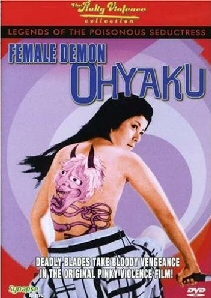
WS: It's great to see Synapse making available the poetic nightmares of Nobus Nakagawa. Celebrated most often for the hell and punishment saga Jigakou, many people aren't aware of the contributions he made to horror and exploitation in general. You have rectified this to an extent by releasing the traditional Asian ghost story Snake Woman's Curse . What drew your attention to this rarely seen film? Where would you place it in terms of Nakawa's achievements? And what storytelling and visual elements did he lend to the ghost story that make him stand out amongst other practitioners?
DM: We did it as a favor for Panik House. I hadn't seen it before they offered it to us and I was quite impressed with both the content and visuals. Honestly, I haven't seen many of his films (I have the Criterion Jigoku, but haven't seen it yet) but I really liked Snake. His technique is very surreal and it starts RIGHT away with the crazy opening credit visuals� and ends with spirits walking in the clouds. It's just amazing.
WS: You also recently released Teuro Ishii's 1969 Japanese Horror of the Malformed Men, an elegant and surrealistic hybrid of science fiction and ancestral horror steeped in an experimental style. What would you like audiences to know about this project, and why it is important to the genre?
DM: What would I like audiences to know? That it's one of the best damn DVDs we've ever released, I guess! Really, it is. It's so beautiful, so indescribable. And the extras, compiled for us by Marc Walkow are outstanding. It's important because it was one of those films that no one has seen in decades and it fully deserves to be out on the market as an amazing example of Japanese cinema from the late sixties. It's bold for the time and still holds up and creeps you out almost 40 years later. It's been one of our most critically acclaimed releases ever� and for good reason. The movie is a stunner.
WS: The Legends of the Poisonous Seductress series was a rare film fan's dream come true, particularly those enamored of the niche Pinky Violence sub-genre. Were these the first US DVD releases of Female Demon Ohyaka, Quick Draw Okatsu, and Okatsu The Fugitive? Where do these titles stand in the history and development of their cinematic tradition? What makes them worthwhile? Lastly, why do you feel they didn't sell as well as you may have predicted?
DM: These three films had never been released on DVD in the USA before our versions came out. Female Demon Ohyaku is pretty noteworthy because it's widely considered to be one of the first ever "Pinky Violence" films. All three are worthwhile viewing� if they weren't we wouldn't have released them! I don't think they sold because they weren't really horrific (in the strictest horror film sense) and many folks may have been uninterested because they might have considered them standard "samurai potboilers" I guess. I don't know� we loved them and think they are great. They were relatively unknown to US audiences, so maybe people didn't want to take the chance. But, those that DID buy them have contacted us and said how great they think they are. I hope maybe they will catch on over time. They are well worth owning.
WS: Tell us something about your upcoming release of the cult film favorite The Kindred? What supplements do you plan on including?
DM: The Kindred is in the early stages and we just finished the HD transfer� the film looks amazing. I had the old video transfer on hand for inspiration to give me an idea of what NOT to make it look like (haha)� the film looks unbelievable now. It's much nastier than I remember, really. We haven't got any firm extras nailed down yet.
WS: Where do you see Synapse headed in the near future? The far future? How about you personally?
DM: I think that, honestly, as time goes on, you may see Synapse expanding out and doing more digital downloading and On Demand. That seems to be where the market is heading. We have dabbled in Amazon Unbox with a few titles and we are talking with Apple to put our product up on iTunes. Also, now that the format war is over, we will be releasing some Blu-Rays in the future. We are in the early planning stages for that. For me personally, I just want to find a nice woman and settle down and have a few kids� you know, get a nice country home and watch the sun go down each night on my porch. Certainly would be a stress reliever, I think. I just gotta find Mrs. Right first.
WS: As more independent labels go under, what is the biggest challenge that Synapse faces? What would you suggest that fans do to secure the release and preservation of underground and non-mainstream movies?
DM: The biggest challenge is licensing all their discarded titles before someone else does! Hahah! No, seriously� I think we just have to learn from their mistakes and better ourselves. I've got a pretty sharp, intelligent business partner now and we're doing OK. Not great, but OK. Nobody's doing great� if they say they are, they're lying. All of the indie labels are suffering right now, so it's hard. But, we push on and continue doing what we're doing. When people stop buying our titles, we'll stop making them. I just really want to stress to the fans that, in order for us all to survive and continue releasing cult films, you HAVE to support us by seeking out the product online. That's where the future is headed for all of us, unfortunately. The stores just don't really need, nor want, us anymore. BUY ONLINE! That's my advice.
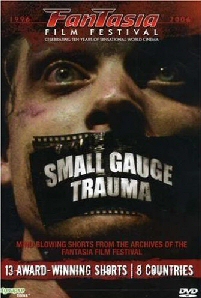
WS: Small Gauge Trauma served as an opportunity for new filmmakers to text their creative chops and as a venue for fans to experience cutting edge talent in the dark and experimental genres. What prompted you to do this DVD, and what do you hope to accomplish with volume two? Speaking of the second volume, can you give us an idea of who will be included?
DM: I have always been a fan of the Fantasia Film Festival, this year will be, I think, my tenth year of going. The festival is amazing and the people who run it are fantastic folks who really know how to tap into what all us genre nuts like to watch. Also, Montreal is one of the greatest cities in the world, so I love visiting. Because I had been going so much, Mitch Davis (one of the founding programmers) and I talked about doing the disc and we put it together to feature the filmmakers and help promote the festival. The one thing I hope to accomplish with Volume 2 is that more people will buy the darn thing. People are really missing out on one of the strongest and coolest DVDs in our line-up if they don't have it. Of course, it was a great seller in Canada� not so much here in the US. Shame, really. We are starting Volume 2 and I don't want to spoil anything, but we will have it announced in a month or two! We are still compiling the shorts right now.
WS: Do you feel the well is running dry, so to speak, for quality horror and science fiction titles? Which genres and/or titles do you see falling to the wayside in the near future? Which do you predict will continue rising in popularity?
DM: I keep hearing it is, but we haven't had any trouble finding some great stuff to release. I think there's plenty to go around because, over time, licenses expire and people like us continue to buy up older films and treat them with respect and better transfer and extras. I'm not worried, although some companies do seem to be. Horror will always be around� it's one of the most popular renters/sellers in the video market. Asian films seem to be on the rise. A lot of distributors are moving away from shot-on-video product, though. A lot of it is crap and people just don't want it (with a few minor exceptions)� there's too much of it out on the market right now. People� if you have a movie you want to shoot, you better start moving to film or, at least good quality HD� you'll have a better chance to sell it.
WS: How long do you think standard DVDs will be available now that Hi-Def and Blue Ray discs are becoming firmly entrenched in the market? Speaking of which, what is your preference between these two new formats? What effect will they have on Synapse?
DM: Regular DVD isn't going anywhere any time soon. Too many people have regular DVD players for it to dry up and go away. The players are cheap and the movies are coming out in hundreds of titles a week. Most analysts predict at least another 10 years for DVD and I agree� I was a big fan of HD DVD and it's a shame it didn't "win" the war. For indie companies, dealing with HD DVD was much cheaper and easier, but that's the way it goes. Blu-Ray isn't even a "finished" format yet, but it's getting there. The discs re improving and we are talking about releasing some things in Blu-Ray in the future. We'll have to see how it goes with the pricing before we jump in, though. It's really expensive for us little guys right now.
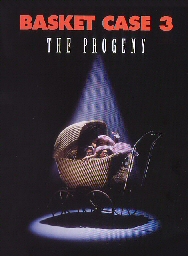
WS: Which upcoming films do you have slated for Synapse?
DM: In April, we have both Karaoke Terror and Party 7 coming out, with Lucker hitting in May. Small Gauge Trauma (2) will be July or August, along with Madame O.
WS: What personal projects are you currently working on?
DM: I just finished up a three week stint in LA doing a few things. I did the HD transfer on The Kindred and finished a new anamorphic widescreen re-mastered version of Patrick, which we'll be putting out later in the year. We are finishing up Home Sick now and working on Basket Case 3 (you heard it here first). We also just finished 42ND Street Forever (Vol. 4). I do have a few teases for you, too. I'm doing a full HD restoration of a classic, rare exploitation film from 1976, using the original camera negative, but I'll have more info shortly. I've also been hired to redo one of my classic restorations over again in HD (much like I did with The Texas Chainsaw Massacre). We won't be releasing it, but Dimension Films will be� I just can't tell you what it is yet! ;) I'm sure they'll be announcing it soon, though.
Special thanks to Don May - for more details about Synapse releases check out the official site here and the company's blog page here.